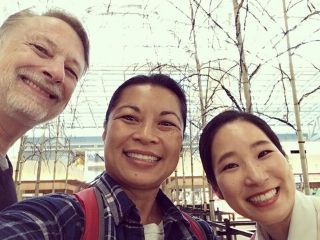
I want to tell you a story about delight. This past Christmas and New Year’s, Diana and I went to the Philippines for a family event. Our return trip included a 14-hour layover at Haneda airport in Japan.
We arrived at Haneda exhausted. We made our way through security and then customs. We wearily found the Japan Airlines customer lounge for international travelers. We dropped our luggage, fell into some comfy chairs, and went to sleep for a few hours. After a long nap, some breakfast, and some coffee, we still had about 8 hours to kill.
Diana had earlier done some research and discovered there is a large cultural exhibit featuring Edo (old Tokyo) in the airport. So we walked over to the customer service desk to get directions. That’s when the adventure began.
The two women who were trying to help us spoke some English, but we had trouble explaining where we wanted to go. And their replies were difficult for us to understand. I could tell, though, when they finally got it. They looked a little shocked and then began to speak to each other in rapid Japanese. Finally, one of them turned to us and asked if we would mind very much waiting for 10 minutes.
I’m not sure what I thought the 10-minute wait was for. Maybe they were going to find a map in a back room or something? Anyway, we had 8 hours to wait. 10 minutes was no big deal. We went back into the lounge and got more coffee.
Before we finished our coffee, Hitomi walked up behind us and asked for us by name. Hitomi is another employee of Japan Airlines who customer service must have called over from another part of the airport (a 10-minute walk away). She spoke perfect English and offered to take us where we needed to go.
As we walked down an employee-only staircase and through a series of back rooms, Hitomi explained to us that since we had already gone through customs, we would have to go through customs “backwards”—as through we were arriving instead of departing. This, it turns out, is not possible to do. So she had to personally speak with the customs agents to make it possible for us. She then patiently waited for us on the other side of the barrier as we got processed through.
I was so grateful. Once we cleared customs, I started thanking her over and over and wishing her well. She politely cut me off and said she was not finished yet. She intended to walk us directly to the exhibit. She wanted to make absolutely sure we did not get lost along the way. I think my mouth literally dropped open. And once we got to the exhibit, we had to assure her many times that we did not need anything else and that she had already exceeded any expectations we had. I started our adventure simply hoping for a hand-drawn map. And what we got instead was a charming tour guide who took us through secret passage ways. “Delight” is the word I thought of to express my feelings about the whole experience.
I tell you this story because “delight” is a core value at TeamRCIA. We want to delight you, of course, and we hope we do. And we also want you to delight your seekers. And we know from the stories you tell us that most of you do. But Hitomi and the employees of Japan Airlines are the gold standard. I wonder how often we go as far as they did to delight our seekers.
Using our experience at the Haneda airport as a template, here are a few goals we can all recommit to or strive for.
Smile
Everyone we talked to in Japan, whether we were customers or just people standing in line together, smiled at us. A lot. As a team, watch each other and see if you are smiling enough. Practice smiling when you talk on the phone. Or even when you are writing an e-mail.
Anticipate your seekers’ needs
Hitomi showed up not to give us map or explain to us how to get where we wanted to go. She showed up to accompany us all the way to our destination. A lot of us think our seekers have a goal of becoming Catholic. For some, that might not be their actual destination. Ronald Rolheiser has said these are some of the goals our seekers may have:
- love
- communion
- community
- friendship
- family
- affection
- wholeness
- consummation
- creativity
- self-perpetuation
- immortality
- joy
- delight
- humor
- self-transcendence
How do we discover what the true goal is for our seekers? We have to ask them. Here is a resource that can help you with that.
How do we discover what the true goal is for our seekers? We have to ask them
Solve problems your seekers have
I am certain that solving our specific problem was not covered in the Japan Airlines employee training manual. Hitomi and her associates used their creative imagination to find a way to make the impossible possible for us. If your seeker can’t come on Wednesday nights or has to be out of town for weeks at a time or has family obligations that interfere with the RCIA schedule, what can you do to make the impossible possible?
Create “wow” experiences for your seekers
Hitomi wowed us. Every time we talk about our trip, we talk about what she did for us. Are you wowing your seekers? Or do they think becoming Catholic involves a long string of classes that they have to patiently sit through? How can you create a sense of wonder and awe about the whole experience that just keeps getting better and better?
Here are some things I wrote about in a previous post that might create some “wow.”
- No classes
- No judgment
- No expectation that they follow a lot of rules
- Someone who listens to their story—and then listens some more
- Church ministers (priests, deacons, catechists) who are vulnerable and share from their heart
- Send a card on their birthdays and anniversaries
- Remember their children’s names
- Give them free tickets to parish events and banquets
- Invite them to a movie
- Invite them to dinner
- Ask their advice
Seek opportunities to learn and grow
Hitomi and the customer service folks at Japan Airlines did not see us as a problem. They were actually excited to be able to figure out a way to help us—even though at first they were a little stumped about what to do. Every hurdle we encounter in our initiation ministry can be a learning opportunity for us. Our challenges are opportunities to become better ministers.
If we work at these disciplines and make them automatic parts of our ministry, we will continually delight our seekers. And once that happens, our formation work becomes exponentially easier. And more delightful!
Your Turn
What special encounters have taught you something about your RCIA ministry? How have you exceeded a seeker’s expectations? Share your thoughts in the comments below.








